The most influential Greek since Alexander the Great? A reappraisal of Spyros P. Skouras
by Ilias Chrissochoidis, Ph.D.
In the long and distinguished history of Greek presence in America, no individual can match the breadth, depth, and duration of influence of Spyros P. Skouras (1893–1971), whose 50th death anniversary we commemorate this year. Arriving in the US in 1910, Spyros and his two brothers soon became leaders in the nascent motion picture industry, controlling the second largest chain of movie theaters in the country. Despite losing their assets in the 1929 crash, they quickly rebuilt their empire during the 1930s topping the ranks of America’s highest paid executives. After masterminding the merger of Fox and Twentieth Century film companies in 1935, Spyros was elected president of the corporation in 1942. During his twenty-year tenure, he oversaw Twentieth Century-Fox’s growth into the second largest film company in the world and was among the pillars of Hollywood’s golden age. As such, he was influencing a global audience of 250 million, an achievement no other Greek had attained since Alexander the Great!
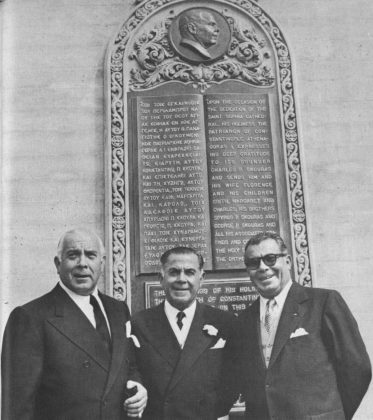
Skouras Brothers’ reunion at the dedication of Saint Sophia Cathedral in LA (from left: Spyros, Charles, and George)
AMERICAN DREAM
Spyros P. Skouras was born on March 28, 1893, in Skourohorion, a few miles outside Olympia, to a family of farmers and herders. Life in rural Greece was harsh and vulnerable to natural disasters. One such, in 1907, destroyed the family’s crops and forced them to take emergency measures.
As his older brother, Konstantinos, sailed to America to find work, Spyros was sent to a local monastery until the age of thirteen and then to the port of Patras, where he worked as an office boy while studying English and accounting. It was there that he first saw a movie.
Having found a stable job at a major hotel in St. Louis, Konstantinos (now Charles) brought Spyros to America in 1910. He was followed by their younger brother George ten months later. The Skouras brothers worked long hours at the city’s premium hotels, earning respect, making friends, and saving money. Impressed by the new film industry, they were eager to start their own business. At the first opportunity, they acquired a local movie theater, which they named “Olympia.” It was the beginning of the Skouras Brothers empire.
Hard drive, ceaseless effort, but also brotherly solidarity soon led to success. By 1923, Skouras Brothers were the top theater operators in St. Louis. Among their innovations were the hiring of female ushers, the introduction of Children’s Matinees, of jazz and large symphonic orchestras on the stage, of the famous precision-dancers “Missouri Rockettes,” and of the now ubiquitous in-house confectioneries. Their crowning achievement was the luxurious Ambassador Building and Theater (1925). Built at a cost of over $6 million it became one of St. Louis’ architectural landmarks.
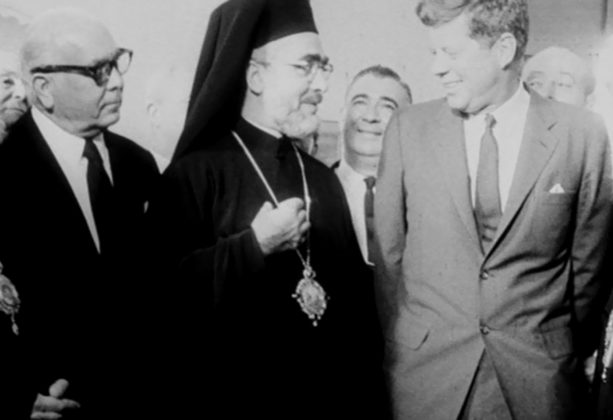
Spyros Skouras and Archbishop Iakovos with President Kennedy
After negotiating the largest merger in film history, between First National Pictures, the Stanley Company of America and Warner Brothers, Spyros moved to New York in 1929 as general manager of Warner’s 550 theaters. He took with him his younger brother George. Two years later he would switch to Paramount and in 1932 he would take responsibility for the 564-strong chain of National Theatres. The Skouras Brothers continued to have a common bank account.
In 1935, Skouras was instrumental in the negotiations that led to the historic merger of the Twentieth Century and Fox Film Corporation into one of the leading film companies in the world. Seven years later he would be elected Twentieth Century-Fox’s second and longest serving president.
Skouras described his business philosophy as follows: “Our habit throughout these years was hard work and concentrated effort in order to win the co-operation of our associates and persuade them to work equally hard. […] One of our policies was that of participation. We knew we could win co-operation by sharing our profits with our managers. We were also aggressive in our insistence for good operation. We insisted upon the finest run theaters in every respect and the finest management. […] in our management of the theaters we felt that the highest aim of the theater was to be the hub of civic activity. We were the first to permit collections in the theaters for causes like that of the Red Cross. We have followed this policy throughout our careers.”
Indeed, with the US entering WWII, the Skouras New York theaters were “the first to become issuing agents for Treasury Department War Bonds. By setting the pattern for movie houses throughout the nation they were instrumental in selling hundreds of millions of dollars worth of war and victory bonds to the public.”
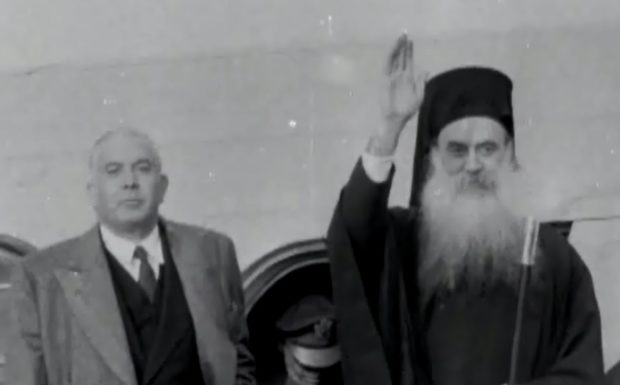
Skouras accompanies newly elected Ecumenical Patriarch Athenagoras to Constantinople
GWRA: THE OMOGENEIA OXI
The galvanizing effect of Greece’s victory over Italy in late 1940 led to the creation of the most influential Diaspora organization, the Greek War Relief Association (GWRA), under the auspices of Archbishop Athenagoras. The daunting task of its coordination was offered to Spyros Skouras, who would serve as its President until 1946.
Using the latest advertisement techniques, and recruiting prominent American citizens and Hollywood celebrities, the GWRA managed to convey a powerful message on the urgency of saving the cradle of Western civilization from annihilation. Skouras was in the thick of action, tirelessly touring the country, coordinating 1700 chapters, consulting with government agencies, and, most crucial, visiting Europe to secure the lift of the British naval blockade of Greece. “It […] became my greatest purpose in life to lift the blockade so that food and medical supplies could get into Greece.” The GWRA “became the most successful and outstanding example of all foreign relief agencies because we raised over $40,000,000 in cash.” The total cost of aid sent to Greece during WWII was over $200 million.
In May 1945, Skouras toured the war-ravaged Greek countryside. His widely reported findings were influential in pressing the US government to continue its aid to Greece in the postwar era. He was also influential in the American government’s decision to propose Archbishop Athenagoras as the new Ecumenical Patriarch in 1949 and accompanied the new leader of the Greek Orthodox Church to Constantinople aboard President Truman’s personal airplane. As he recounted, “Immediately, I became greatly affected by Athenagoras’ magnetic personality and manner. […] He has had a tremendous influence on my life and work. […] He used to come see films with me and then he asked why I didn’t make some religious films for all of the people to see. His influence caused me to produce The Song of Bernadette [1943], A Man called Peter [1955], and The Robe [1953]. It also encouraged me to show family type of motion pictures like The Sound of Music [1965].”
Skouras’ inspiring leadership of the GWRA turned him into a legend. As the most prominent American of Greek descent, he worked tirelessly to promote peace and prosperity in war-devastated Greece. He used his close links with the US government to help Greece’s interests, contain the Cyprus crisis, and maintain stability in the Eastern Mediterranean. He was instrumental in establishing Greece as a modern tourist destination thanks to the spectacular footage of Greek monuments and landscapes in the TCF films Boy on a Dolphin, It Happened in Athens, and The 300 Spartans. In December 1964, TCF would release the film that defined modern Greece in the world’s imagination, Zorba the Greek.
In America, too, Spyros became a source of inspiration and financial support for the Greek Orthodox community. In 1952, his brother Charles’ dream to build a church in Los Angeles became reality. Although he bore much of the cost for the $2 million Cathedral of Saint Sophia, an architectural treasure of the city, Spyros and George also contributed funds towards its completion. (Fun fact: Its pipe organ came from a local movie theater.)
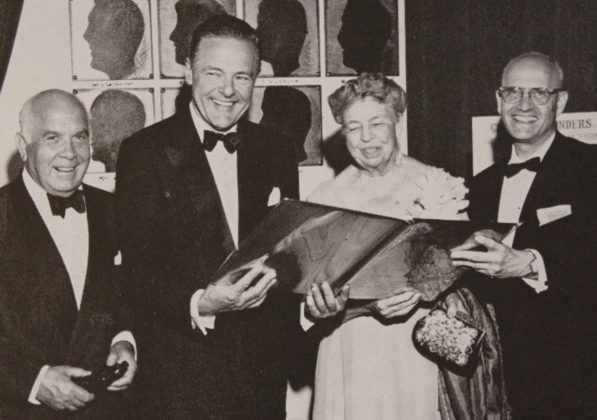
Skouras with Henry Cabot Lodge Jr. and Eleanor Roosevelt
A FILM INDUSTRY LEADER
Skouras was elected President of Twentieth Century-Fox Film Corporation (TCF) in April 1942. During his twenty year-tenure the company grew into a multinational corporation, paying its stock holders millions of dollars in dividends, and enriching the art of motion picture with dozen classic films. In addition, TCF pioneered religious-themed films and tackled taboo social issues, such as racism, anti-semitism, and mental illness. Among the film stars that TCF created in the 1950s were Marilyn Monroe and Elvis Presley. Skouras’ support was critical for Monroe’s transformation from a starlet into Hollywood’s biggest star.
In 1953, Skouras earned worldwide fame as the man who implemented the second revolution in film history, the widescreen format. In the course of nine months, TCF managed to acquire the rights of the new CinemaScope technique, adopt it for its forthcoming blockbuster The Robe, and, most crucial, convincing thousands of movie exhibitors to switch to the new format. The estimated cost of implementing Cinemascope was close to $250 million. Another Skouras legacy was the development of TCF’s studio backlot into the futuristic Century City, the largest construction project in Los Angeles’ history.
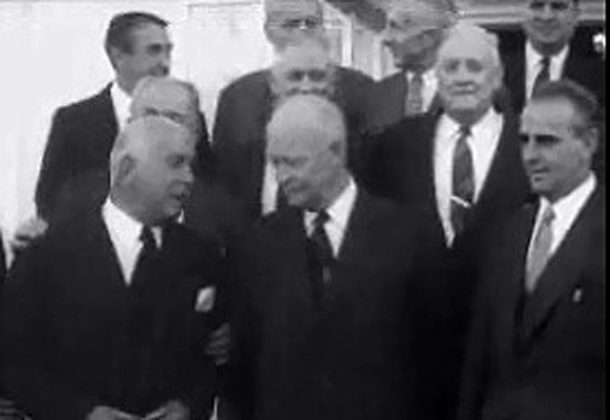
Skouras with President Eisenhower and Prime Minister Caramanlis
AMERICAN CITIZEN AND PHILANTHROPIST
As President of a multinational corporation with offices in five continents, Skouras was travelling an average of 150,000 miles every year. These tours made him deeply knowledgeable of international affairs and his views valuable to the US government. Few Americans citizens of his generation had access to the White House under six different administrations, from the FDR to the Nixon presidencies. Skouras also served in several Presidential committees as one of the nation’s most respectful businessmen. President Eisenhower confided “I have not only a real affection for Spyros Skouras, I have found him to be a most public-spirited citizen devoted to our country and fully as ready to work for America’s welfare as any native-born citizen of my acquaintance.”
In September 1959, Skouras captured international attention by calling the Soviet Union “the greatest corporation, the greatest capitalistic firm, the greatest monopoly the world has ever known” before an amused Khrushchev during a Hollywood luncheon.
The success of the Greek War Relief Association and his prominent place in New York’s business elite turned Skouras into one of America’s most sought-after fundraisers. Until his death, he would invest much of his free time in dozens of philanthropic activities, raising millions of dollars for educational, cultural, ethnic, and medical causes. A member of the New York Philharmonic Orchestra’s Board of Directors and a personal friend of Dimitri Mitropoulos, Skouras pioneered the spread of classical music to general audiences through a series of concerts at the Roxy movie theater in 1950 and 1951.
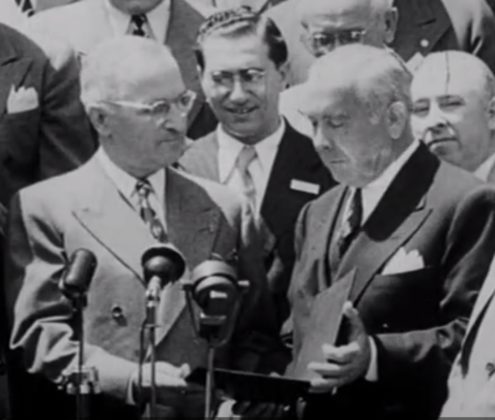
Skouras with President Truman
LATER YEARS
A lifelong Republican, Skouras belonged in the progressive wing of the party, feverishly supporting the Presidential candidacies of Eisenhower and Nelson Rockefeller. In 1964, he rebuked Barry Goldwater’s radicalism by voting for his Democrat friend Lyndon B. Johnson.
In 1962, Skouras celebrated twenty years at the helm of TCF, a period that saw the growth of the company into a multinational corporation and a leader in the entertainment industry. Trouble was looming, however, partly due to dwindling revenue and certainly because of the company’s latest gamble. In an effort to fill the company’s coffers, Skouras had upgraded the production of Cleopatra into TCF’s most expensive film ever. A cascade of delays, a life-threatening illness of Elizabeth Taylor, and the most notorious erotic scandal in Hollywood annals led to financial hemorrhage, protests from stockholders, and eventually to Skouras’ resignation. Despite his enforced resignation from the presidency of TCF, Skouras remained Honorary Chairman of the Board of Directors, continuing his association with the company until 1969.
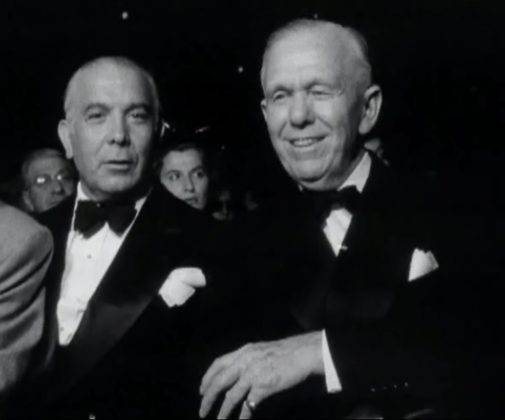
Skouras with George C. Marshall
A ship-owner for some years, Skouras resolved to modernize America’s commercial fleet, introducing the first almost fully automated ships in the country. In 1965, he proposed to the US government a colossal $250 million plan to construct 16 special freighters each carrying 50 barges that would be lifted off and on without the mother ship ever docking at the harbor, thus slashing shipping costs and time. The plan was shelved following strong opposition from New York’s powerful dock worker unions.
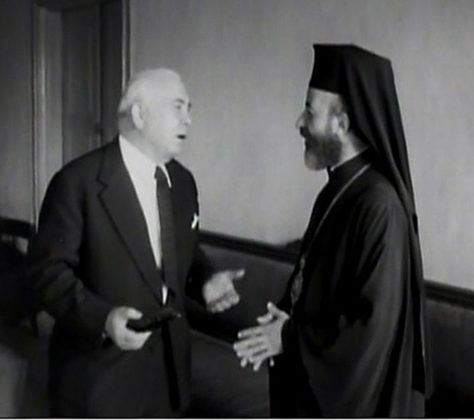
Skouras with Archbishop & President Makarios of Cyprus
Having lost his brothers Charles and George of heart attack, in 1954 and 1964, respectively, Spyros Skouras died of the same cause on August 16, 1971. “A grand man has passed away today,” G . P. Livanos wrote to his widow. “With him a[n] era passed away which encompassed the ideals of American democracy and success. The American story was never told any better than by Spyros P. Skouras”.
Sources
Spyros P. Skouras’ Memoirs (1893–1953), compiled/edited by Ilias Chrissochoidis (Stanford, 2013): https://www.amazon.com/Spyros-P-Skouras-Memoirs-1893-1953/dp/0615769497
Web portal at Stanford University: https://web.stanford.edu/~ichriss/Skouras.htm
Youtube channel: https://www.youtube.com/channel/UCDj5e20gvRBdWEBeeCG1uuA
Ilias Chrissochoidis (https://web.stanford.edu/~ichriss/) is a Stanford-based research historian, author, and composer. He has pioneered research on Skouras’ life and humanitarian achievements, and has made numerous archival discoveries on modern Greek history.


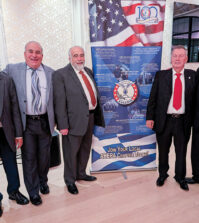












0 comments